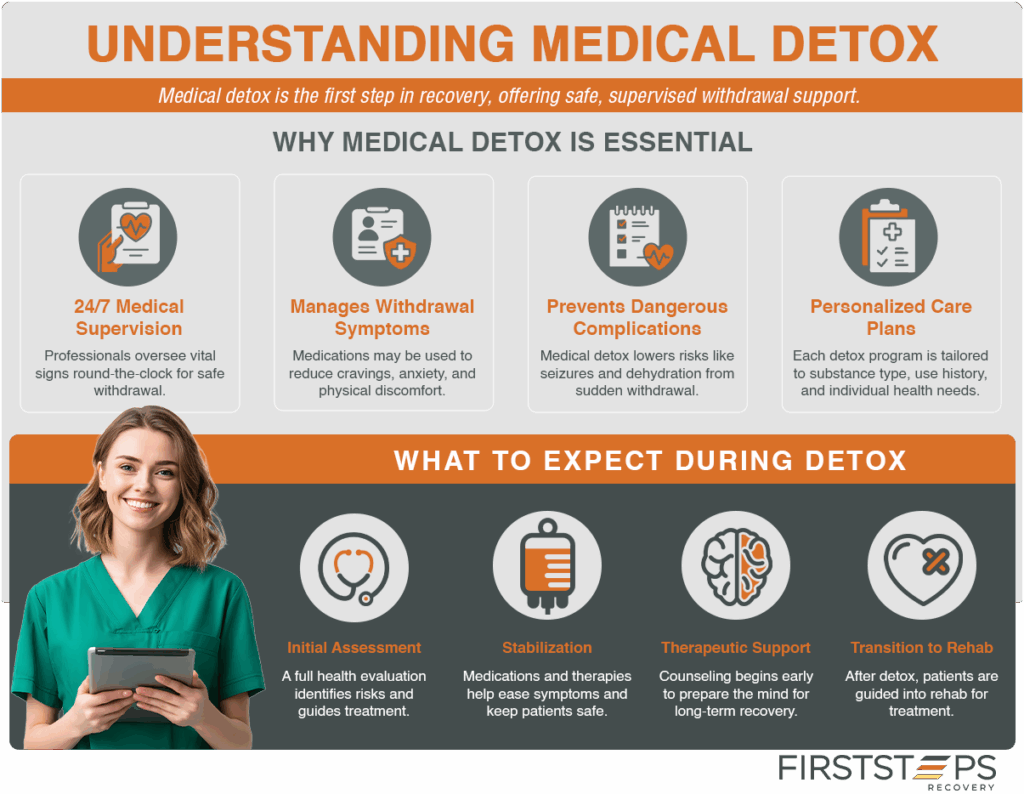If you or someone you know is struggling with substance abuse, it’s crucial to understand the importance of medical detox in the recovery process. It can be essential for reaching recovery goals, can help a person maintain sobriety during treatment services, and truly begin the healing process on the right foot. The detoxification process, especially when medically assisted, is a critical phase that ensures a safe and comfortable withdrawal experience with professional support.
Medical detoxification, also known as detox, is the process of removing harmful substances, such as drugs or alcohol, from the body under the supervision of medical professionals. Substance use can lead to physical dependence and withdrawal symptoms, making medical detox necessary to safely manage the effects of substance use and begin recovery. This process aims to address the physical and psychological aspects of addiction. This helps to set the tone for a person’s stay at an addiction treatment center or their general journey to sobriety.
Have questions about how our treatment programs works? Contact us today.

In the initial period after stopping the use of a substance, individuals may experience withdrawal symptoms as their bodies adjust to the absence of the substance. These symptoms can include:
Depending on the strength of a person’s addiction and the addictive substance itself, these symptoms can range from mild to severe.
Medical detox is the process of monitoring and providing medical support during the period of initial withdrawal. Medical professionals closely monitor patients during this time to ensure their safety and provide medications or other interventions to help manage these symptoms. Substances like heroin have distinct phases of withdrawal, which a medical professional can help a person through. Opiate detoxification is a critical step in managing opioid addiction, especially for individuals who developed dependence while seeking pain relief for chronic pain.
The detox process can have serious medical consequences if problems that arise aren’t dealt with adequately by a medical professional. Alcohol withdrawal carries particularly dangerous withdrawal symptoms. Someone with a severe alcohol addiction can experience seizures or the phenomenon called delirium tremens. Attempting to go through detox of a severe alcohol addiction may result in damage to the heart, strain on the central nervous system, and even death.

Medical detox is a crucial first step in addiction recovery, as it helps individuals safely manage the withdrawal process. The withdrawal symptoms can be intense and potentially life-threatening, and delaying the process of detox can result in relapse simply to stop the symptoms.
During medical detox, patients are carefully monitored by healthcare professionals who specialize in addiction medicine. These professionals are trained to recognize and address any complications that may arise during the withdrawal process. Medication-assisted treatment is often part of this care, providing supervised detoxification to help individuals overcome withdrawal symptoms and start their recovery process.
In addition to medical supervision, individuals in medical detox programs often have access to individual therapy to address the psychological aspects of addiction. It is also important to identify and treat any co-occurring disorder during detox, as addressing both substance use and mental health conditions leads to more effective recovery outcomes.

During medical detox, individuals struggling with alcohol or substance abuse undergo a series of assessments to evaluate their physical and psychological health. This includes a thorough medical history review, blood tests, and a comprehensive examination to determine the appropriate detox approach. During these assessments, it is important to evaluate for chronic pain and consider the need for specialized management to ensure effective and safe detoxification.
Once the detox program begins, individuals may experience withdrawal symptoms such as:
It’s important to stay in constant communication with medical professionals during the detox process. Individuals undergoing detox may also experience emotional and psychological challenges. It is common for individuals to feel a sense of vulnerability, fear, and uncertainty.
Individuals may also experience fluctuations in mood and energy levels. It is recommended that individuals undergoing detox to engage in activities that promote relaxation, such as mindfulness exercises, gentle yoga, or creating art to help manage these changes.
In a medically supervised detox program, healthcare professionals closely monitor individuals throughout the detox process. This enables them to assess the severity of withdrawal symptoms and make necessary adjustments to the treatment plan. The goal is to keep patients as comfortable as possible while preparing them for the next phase of their recovery. Healthcare professionals are trained to recognize symptoms of withdrawal and provide appropriate interventions to alleviate discomfort and ensure the safety of the patient.
Healthcare professionals also pay close attention to the psychological and emotional well-being of individuals undergoing detox. Withdrawal can be a challenging and emotionally taxing experience. A medical professional can help a person experiencing withdrawal to tell the difference between an uncomfortable symptom of substance abuse withdrawal and a genuine sign that something is wrong. By providing comprehensive care that speaks to the physical and emotional experience of withdrawal, healthcare professionals can support patients in their journey toward recovery.

Medications may be prescribed during detox to help manage withdrawal symptoms and minimize cravings. Common medications utilized in detox include:
Methadone is a synthetic opioid that helps reduce withdrawal symptoms and cravings in individuals undergoing detoxification from opioid addiction. It works by binding to the same receptors in the brain as opioids, providing a similar effect without the intense high.
Suboxone is a combination medication containing buprenorphine and naloxone. Buprenorphine helps alleviate withdrawal symptoms and cravings, while naloxone blocks the effects of opioids. This can help prevent relapse.
Benzodiazepine medications are central nervous system depressants commonly used to manage anxiety and other symptoms during detox. However, the use of these medications is carefully monitored due to their potential for addiction and overdose.
Antidepressants may be prescribed during detox to address co-occurring mental health conditions, such as depression disorders or chronic anxiety. By stabilizing a person’s mood and overall well-being, antidepressants can help individuals navigate the detox process with more clarity.
In addition to medications, a comprehensive treatment plan may include individual and group therapy to support individuals in these crucial beginning stages of the recovery journey.
Alongside medical interventions, holistic approaches play a vital role in supporting individuals during detox. Detox programs (as part of a greater individualized treatment plan) can incorporate therapies such as:
These holistic components address the physical, mental, and emotional aspects of addiction, promoting overall well-being and a holistic approach to recovery.
Individual therapy sessions provide a safe space for individuals to explore the root causes of their addiction and develop coping strategies for the future. Group therapy sessions can help foster a sense of community and connection among individuals going through similar experiences. Sharing stories, offering support, and receiving feedback from peers can be incredibly empowering and validating during the detox process.

Completing the detox process is a significant accomplishment, but it’s important to remember that detox alone is not sufficient for long-term recovery. Individuals must have a support system in place during this vulnerable time. This can include family, friends, sponsors, or healthcare professionals who can provide encouragement and guidance. A supportive environment can mean the difference between continued drug or alcohol addiction and continuing the recovery process.
To sustain sobriety and address the underlying causes of addiction, individuals should transition to a comprehensive treatment program. These programs may include inpatient or outpatient rehab, drug rehab, counseling, support groups, and aftercare services. The post-detox phase sets the stage for long-term success in recovery.
Developing healthy habits and coping mechanisms is essential during the post-detox phase. This may include creating a daily routine that includes exercise, nutritious meals, adequate sleep, and stress-reducing activities. This can help to empower a person to continue their journey with fresh resources.
At First Steps Recovery, individuals can access safe and supportive medical detox programs to begin their journey towards recovery. With the right medical guidance, holistic support, and a personalized treatment plan, we work to help people build a sustainable life of sobriety beyond addiction treatment. Contact First Steps today to learn more about how we can help you on your journey.

From our certified therapists and nurses to our emotional support animal "Cooper", our entire team is dedicated to the health and success of our clients throughout our program and beyond.
First Steps Recovery Treatment Programs and Expected Timelines
*Contingent on substances that are abused.
*Contingent on substances that are abused.
*Extended support services outpatient including psychiatry, family support therapy, couples therapy, individual therapy, group therapy, biofeedback, and TMS are available through our counseling and psychiatry institute in Fresno.
Dayatra L.
Melissa B.
Bruce G.
Have questions about how our alumni program works? Let's talk.










Have questions about First Steps Recovery? We're here to help.
© Copyright 2023 • First Steps Recovery • All Rights Reserved